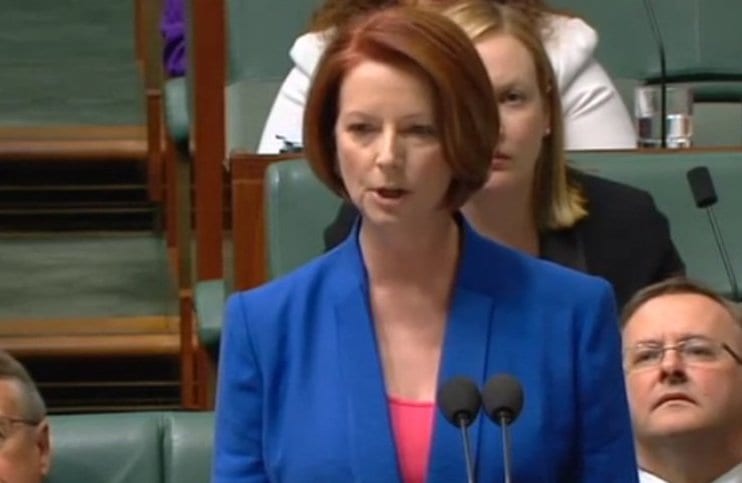One perspicacious sentiment she uttered has been repeated and repeated ad nauseam since that fateful evening with good reason. It was and remains immensely instructive.
Being a woman didn’t explain everything about her prime ministership, nor did it explain nothing. It explained some things.
Since that time, change has occurred such that there is now a greater awareness and more widespread acceptance that being a female leader is a unique and colossal challenge.
This change in atmosphere is why the London-based Global Institute for Women’s Leadership has been launched and it is why Gillard accepted the role as its inaugural chair.
Initiatives to identify and remove the barriers that stifle female leadership are not new, but the profile and validity being afforded to such endeavours is. The appetite for concerted action to achieve gender equality is undeniable and unprecedented.
Back in 2010 when Gillard became Australia’s first female prime minister this was not the case. To the contrary, the hostility she faced when she even dared mention gender was white hot. It was an illegitimate “card” she played whenever the going got tough.
In an interview with Fairfax Media on Thursday Julia Gillard confessed she believes not mentioning her gender earlier in her prime ministership was a mistake.
‘I thought that the maximum interest in the gender bit would be in the early days of when I was prime minister and then it would flatten out…and yes there was a reaction when I first became prime minister but then as the government continued to govern and things got tougher, actually it got more gendered, the gendered insults became the go-to weapon, and because [I] hadn’t said anything about it all this time to then suddenly say ‘oh this is the gendered bit’, people would say ‘well you’re only saying that because you’re in trouble’ and so it got harder to pull it out.’
It is an astute and interesting observation but in terribly stereotyped fashion it amounts, in part, to Gillard accepting personal responsibility for a problem beyond her own making.
Gillard’s regret about her perceived error in not raising gender earlier needs to be tempered with the context in which she was operating when she was PM. We will never know how things might have played out if Gillard had openly and proudly acknowledged her gender from the very beginning. Perhaps it could have taken some of the sting and shame out of the sexist narrative her opponents preferred.
But equally those opponents and the climate in which they flourished cannot be dismissed. With Tony Abbott across the despatch box a meaningful discussion about gender was never a viable possibility. Australia was not interested in, nor ready for, a constructive conversation about gender and that history cannot be revised.
Gillard’s capacity for reflection is such that she is willing to examine what she could have done differently (an inclination few of her male political peers don’t enjoy). And while there is merit in self-analysis, there is also merit in accepting the limits of personal choice.
Being aware of the parameters of our workplaces – and recognising what the data tells us about discrimination and sexism – is advice Gillard gives young women.
“I would have said across a lot of my political life, my life in the law before that, that I hadn’t experienced any barriers because of my gender. I thought for a period of time that we were going to be the generation that everything was going to be different…and look what I learnt along the way.”
It is true that in the eight years since Australia got its first female PM the public discourse has moved. Gender equality is no longer automatically dismissed as an entirely niche subject: it has inched its way towards the mainstream as a live issue.
#MeToo and #TimesUp have accelerated this in recent months but conversation is not the same as action. Inequality persists – in pay, power and privilege. Women in Australia are still being discriminated against, harassed, underpaid and underrepresented in leadership positions.
If Julia Gillard was PM now, there is no doubt that raising and tackling those issues would be within the realm of possibility. But back then it was anything but.


